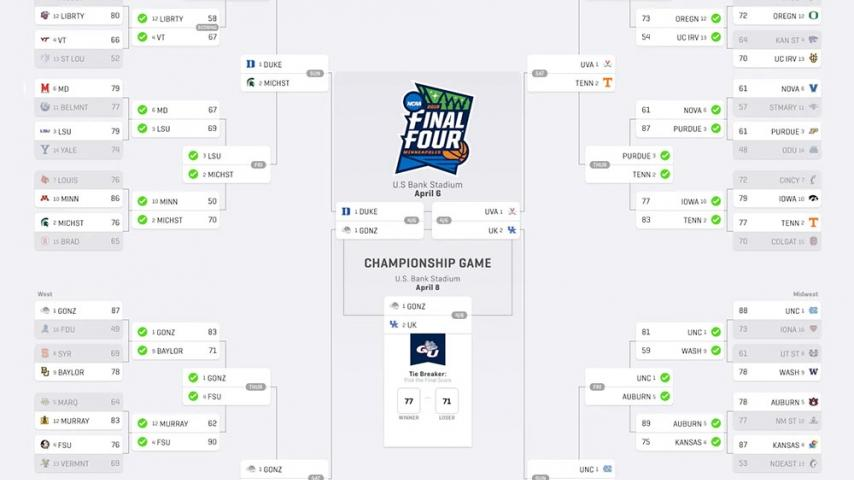The quest for a perfect NCAA bracket has long captured the imagination of basketball fans, especially during the thrilling NCAA tournament each March. With statistics indicating the odds of achieving this elusive feat are astronomically low, many wonder if anyone will ever fill out a flawless bracket in their lifetime. The perfect bracket requires accurately predicting the outcomes of 64 games, which is akin to winning the Powerball lottery back-to-back. In a competition filled with upsets, the possibility of outsmarting the bracket odds seems daunting, yet millions participate each year, hoping to tip the scales in their favor. Whether you’re a casual fan or vying for the title of office pool winner, understanding perfect bracket statistics can elevate your March Madness experience and strategy for improving your chances.
In the world of college basketball, the ideal bracket represents an unattainable dream for many fans during the electrifying NCAA championship event. As March Madness unfolds, enthusiasts fill out their selections with hopes of crafting the ultimate winning combination. Yet, the complexity of predicting which teams will advance further complicates the process. Each year, participants engage in friendly competitions, aiming to outmaneuver their colleagues in office pools while navigating the unpredictable nature of the tournament. Ultimately, while perfection remains out of reach, strategic insight and an understanding of bracket dynamics can significantly enhance your tournament experience.
Understanding the Odds of a Perfect NCAA Bracket
The quest for a perfect NCAA bracket during March Madness captivates fans and stat lovers alike. With 64 teams participating in the tournament, predicting the outcome of all 63 games accurately seems nearly impossible. Statistically, the odds of achieving a perfect bracket are estimated to be 1 in 2^63, which translates to an unfathomable probability in the quintillions. This kind of improbability is often likened to winning the Powerball jackpot twice in a row, emphasizing just how unlikely it is to see a perfect bracket in our lifetime.
Historically, no one has officially reported a perfect NCAA bracket, despite millions of entries every year in various contests. The key to understanding these bracket odds lies in recognizing that the tournament isn’t simply a 64-team lottery; rather, it incorporates skillful analysis of team performances, favorites, and potential upsets. As the tournament progresses, statistical analysis becomes crucial, as it helps in making more educated guesses that can improve one’s chances in filling out a bracket.
Frequently Asked Questions
What are the odds of creating a perfect NCAA bracket?
The odds of creating a perfect NCAA bracket are astronomically low, estimated at 1 in 9.2 quintillion. This is based on the 63 games in a typical NCAA tournament. To achieve a perfect bracket, you must predict the outcome of every single game correctly, which includes selecting the teams that will win all rounds of the tournament. This makes the pursuit of a perfect bracket a rare event, often said to be unlikely to occur in a person’s lifetime.
Why has no one reported a perfect NCAA bracket in history?
No one has reported achieving a perfect NCAA bracket because the statistical probability is incredibly low. Given that there are numerous unpredictable factors, such as team performance and unexpected upsets during March Madness, it adds to the difficulty. The absence of reported perfect brackets reinforces the idea that even with statistical analysis, the sheer number of games makes it nearly impossible to predict accurately.
How can I improve my chances of winning an office pool with my NCAA bracket?
To improve your chances of winning an office pool with your NCAA bracket, focus on a balance of choosing favorites and identifying potential upsets. Analyze team statistics, match-ups, and historical performances in the NCAA tournament. In larger pools, selecting a few strategic upsets can help distinguish your bracket from others while still relying on strong favorites to secure a solid foundation.
What are some strategies for picking a perfect NCAA bracket?
While picking a perfect NCAA bracket is virtually impossible, employing strategic tactics can help. Consider choosing the higher seed in matchups, but also research potential upsets based on current season performance. Many successful brackets are built by selecting a few lower seeds to advance past the first round, giving an edge in competitive tournaments like March Madness.
What is the significance of perfect bracket statistics during the NCAA tournament?
Perfect bracket statistics provide insight into how unpredictable the NCAA tournament can be. These statistics highlight the extreme difficulty of achieving a perfect bracket and inform fans about common patterns and outcomes. Understanding these metrics can help both casual fans and bracket analysts make more educated predictions during March Madness.
Can technology help in predicting a perfect NCAA bracket?
Technology can assist in predicting NCAA brackets by utilizing algorithms and advanced analytics that analyze historical data, team performance, and player statistics. While no technology can guarantee a perfect NCAA bracket due to the inherent unpredictability of the tournament, such tools can provide valuable insights and enhance the efficiency of your bracket selections.
What is considered a perfect bracket in the context of March Madness?
A perfect bracket in March Madness refers to a correctly predicted outcome for all games in the NCAA tournament. This entails selecting the winning team in each of the 63 matchups, from the first round through to the championship. Achieving a perfect bracket is exceptionally challenging due to the sheer number of games and potential upsets, making it one of the coveted achievements among fans and players alike.
| Key Point | Details |
|---|---|
| Odds of Perfect Bracket | The chances of creating a perfect NCAA bracket are astronomically low, calculated as 1 in 2^63, equal to quintillions. |
| Historical Context | No perfect NCAA bracket has ever been reported, highlighting the difficulty of achieving this feat. |
| Game Dynamics | Winning requires picking all games correctly, and while top seeds rarely lose in the first round, upsets are common. |
| Winning Office Pools | Success in office brackets often depends on distinguishing picks from others, requiring some correct upsets. |
Summary
Achieving a perfect NCAA bracket is an incredibly challenging task that is statistically unlikely to happen in anyone’s lifetime. With the odds stacked against you at a quintillion-to-one, most participants will never witness a flawless bracket. Understanding the dynamics of the tournament and employing strategic picks can improve chances in office pools, but the quest for a perfect NCAA bracket remains elusive.



